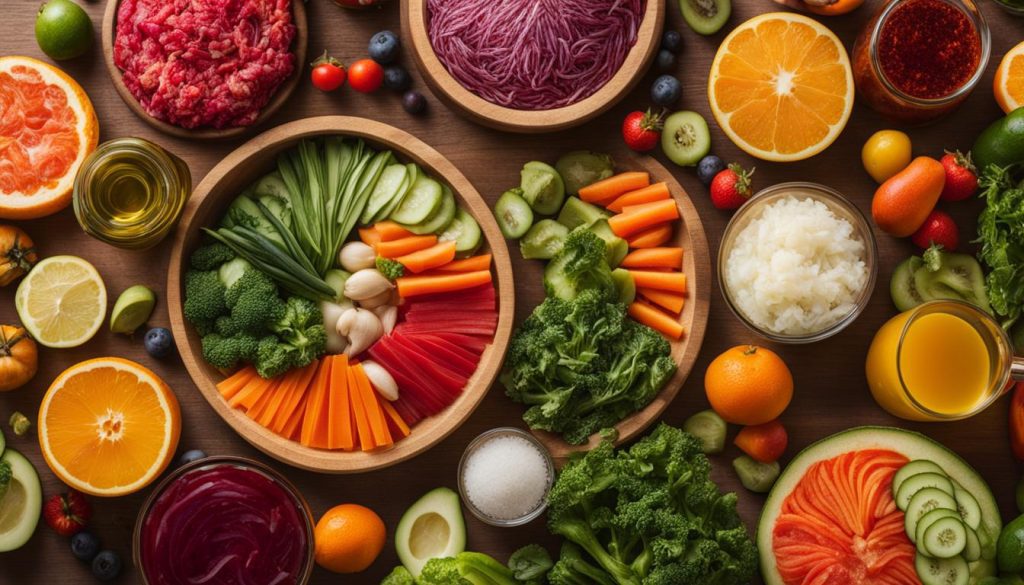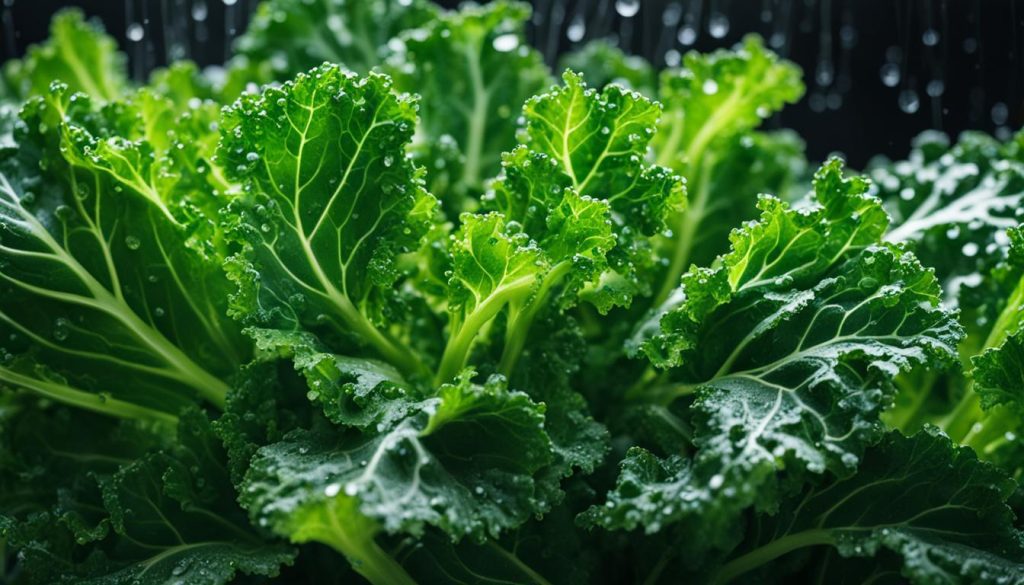I’m excited to share some valuable information with you about the connection between diet and our mental health. Did you know that the foods we eat can actually impact our brain function? It’s true! That’s why incorporating brain-boosting foods into our diet is essential for enhancing memory, focus, and overall cognitive health.
So, what are these brain-boosting foods? Well, I’m glad you asked! In this article, I’ll be highlighting some of the best foods for the brain – the cognitive superfoods that can give your mind the ultimate boost!
Key Takeaways:
- By incorporating brain-boosting foods into your diet, you can enhance memory, focus, and overall cognitive health.
- Spices, such as turmeric and saffron, possess antioxidant properties that can reduce anxiety and symptoms of depression.
- Fermented foods, like yogurt and sauerkraut, contain live bacteria that improve gut function and protect the brain.
- Dark chocolate with minimal sugar is an excellent source of iron and antioxidants, which regulate mood and reduce the risk of depression.
- Avocados are rich in magnesium, a nutrient essential for brain function, and can aid in depression recovery.
The Power of Spices for Brain Health
Spices not only add flavor to our meals, but they also have incredible benefits for our brain health. In addition to their aromatic properties, spices possess antioxidant properties that can help fight off harmful free radicals in the brain. One particular spice that stands out is turmeric, which contains a compound called curcumin. Curcumin has been shown to reduce anxiety and protect the hippocampus, the region of the brain associated with memory and emotion. Adding turmeric to your cooking or consuming it as a supplement can have a positive impact on your brain health.
Saffron is another spice that has been found to have remarkable effects on mental well-being. Research has shown that saffron can significantly reduce symptoms of depression, making it a valuable natural remedy for those struggling with their mental health. By incorporating saffron into your diet, you can potentially improve your mood and overall brain health.
Next time you’re in the kitchen, don’t forget to sprinkle some turmeric or saffron in your dishes. These flavorful spices not only enhance the taste of your meals but also offer a range of benefits for your brain health.
Unlocking the Potential of Spices
While the antioxidant properties of spices contribute to their brain-boosting abilities, their effects extend beyond that. Spices are also known to have anti-inflammatory and antimicrobial properties, which can further enhance their potential in supporting brain health.
In addition to turmeric and saffron, other spices like cinnamon, ginger, and black pepper also offer various health benefits. Cinnamon, for example, has been shown to improve cognitive function and memory. Ginger, on the other hand, possesses antioxidant and anti-inflammatory properties that can help protect the brain from age-related decline. Black pepper contains a compound called piperine, which has been linked to improved brain function.
By incorporating a variety of spices into your diet, you can enjoy a range of flavors while also nourishing your brain.
The Benefits of Fermented Foods for Cognitive Function
When it comes to maintaining a healthy gut and supporting optimal cognitive function, adding fermented foods to your diet can make a world of difference. Fermented foods like yogurt, sauerkraut, kimchi, and kombucha are not only delicious but they also contain beneficial live bacteria that promote a healthy gut environment.
These live bacteria, known as probiotics, play a vital role in regulating digestion and enhancing nutrient absorption. They have been shown to improve healthy gut function, which in turn can have a positive impact on cognitive health. A healthy gut is essential for overall well-being, and emerging research suggests that it may also protect the brain.
Studies have indicated that fermented foods may improve memory and slow down age-related cognitive decline. The live bacteria in these foods interact with the gut microbiome, releasing compounds that can positively influence brain health. Additionally, fermented foods have been found to decrease anxiety, further highlighting their potential benefits for mental wellness.
Adding fermented foods to your diet is a simple and delicious way to nourish your body and support your brain. Whether you enjoy a refreshing cup of yogurt in the morning or savor the tangy flavors of sauerkraut with your lunch, these foods offer a host of benefits for your gut and cognitive function.

Improving Gut Health for Overall Well-Being
One of the key reasons fermented foods are beneficial for cognitive function is because they improve gut health. A healthy gut plays a crucial role in maintaining overall well-being, and it is closely linked to brain health.
When your gut is healthy, it helps to break down and absorb nutrients from the foods you eat, ensuring that your body receives the nourishment it needs. Additionally, a healthy gut houses a diverse and balanced microbiome, which consists of trillions of bacteria that support digestion, immune function, and even mental health.
Consuming fermented foods introduces live bacteria into your gut, which can help replenish and diversify the microbiome. These bacteria interact with the existing gut bacteria and release beneficial compounds that support gut health. This improved gut health, in turn, can have a positive impact on cognitive function and overall mental well-being.
By simply incorporating a variety of fermented foods into your diet, you can take an active step towards improving your gut health and supporting a healthy mind.
Dark Chocolate for Brain Health
When it comes to indulging in a sweet treat, dark chocolate can actually be good for your brain health. Not only is it delicious, but it also contains important nutrients that can benefit your cognitive function.
One of the key nutrients found in dark chocolate is iron. Iron plays a crucial role in the body, including protecting neurons and regulating mood. By incorporating dark chocolate into your diet, you can help ensure that your brain has an adequate supply of iron to function optimally.
In addition to iron, dark chocolate is also rich in antioxidants. These powerful compounds help to combat oxidative stress in the body, which can damage cells and contribute to various health issues. Including dark chocolate with minimal sugar as part of your regular diet can provide you with an abundant supply of antioxidants to support brain health.
Not all chocolate is created equal, however. It’s important to choose dark chocolate with a high cocoa content (70% or higher) and minimal added sugars. This ensures that you’re getting the most nutritional benefits without unnecessary additives.
Research has even suggested that regular consumption of dark chocolate may be associated with a reduced risk of depression symptoms. So, the next time you’re craving something sweet, reach for a square of dark chocolate to give your brain a boost.
Avocados for Brain Function
When it comes to nourishing our brains, avocados are a delicious and nutritious option to consider. These creamy fruits are not only versatile but also packed with essential nutrients, including magnesium, which plays a vital role in brain function.
Studies have shown that magnesium deficiency is linked to depression, a condition that affects millions of people worldwide. However, research has also indicated that supplementation with magnesium can lead to rapid recovery from major depression.
By incorporating avocados into your diet, you can naturally boost your magnesium intake and support your brain’s well-being. Whether enjoyed as a spread on toast or as a dip for your favorite vegetables, avocados provide a brain-healthy snack option that is both satisfying and beneficial.
In addition to magnesium, avocados also contain other nutrients like vitamin K, vitamin C, and B vitamins, which further contribute to maintaining optimal cognitive health. So, next time you’re looking to fuel your brain, consider reaching for avocados and reap the benefits of their brain-boosting properties.
Nuts for Cognitive Health
When it comes to nourishing your brain, nuts are a delicious and nutritious option. Packed with healthy fats, oils, vitamins, and minerals, nuts provide essential nutrients that support optimal brain function. One type of nut that stands out for its cognitive benefits is walnuts.
Did you know? Walnuts are rich in omega-3 fatty acids, which have anti-inflammatory and antioxidant effects that can improve thinking and memory.
Omega-3 fatty acids are a type of healthy fat that your body needs, but cannot produce on its own. They play a vital role in maintaining brain health and have been linked to improved cognitive function. Including walnuts in your diet is an easy way to boost your omega-3 intake and support your brain.
Research has shown that omega-3 fatty acids have numerous cognitive benefits, including enhancing memory, improving focus, and reducing the risk of cognitive decline as we age. These powerful nutrients help nourish the brain, promoting optimal functioning and overall cognitive health.
It’s important to note that while nuts are beneficial for cognitive health, moderation is key. Nuts are high in calories, so it’s best to enjoy them in appropriate portions. A handful of nuts, such as almonds or walnuts, makes a great snack or addition to meals without compromising your overall calorie intake.
So, the next time you’re looking for a brain-boosting snack, reach for a handful of nuts. Your brain will thank you!
Leafy Greens for Brain Protection
I always make sure to incorporate leafy greens like kale and spinach into my meals for their incredible brain-boosting benefits. Not only do they add a vibrant touch to my plate, but they are also packed with essential nutrients that support cognitive health.
Leafy greens are rich in vitamin E, carotenoids, flavonoids, and folate, which are all essential for brain protection. Folate, in particular, has shown promising results in dementia prevention and cognitive decline. It plays a crucial role in supporting red blood cell formation and neurotransmitter production, both of which are key for optimal brain function.

Incorporating leafy greens into your diet can have a significant impact on your cognitive health. Studies have shown that regular consumption of leafy greens is associated with a reduced risk of dementia and improved memory.
Next time you’re planning your meals, don’t forget to add a generous serving of leafy greens to nourish your brain and enhance your overall well-being.
The Link Between Diet and Mental Health
Research has shown a strong link between diet and mental health. While the evidence for many specific diets is still relatively weak, there is solid scientific evidence supporting the impact of diet on our mental well-being. Certain diets, such as the Mediterranean diet, have been associated with improved mental health.
It’s important to note that the connection between diet and mental well-being is complex and multifaceted. While some studies have found positive associations, others may have mixed results or limitations. Therefore, more research is needed to fully understand the intricate relationship between diet and mental health.
However, the existing evidence does suggest that our diet plays a significant role in shaping our mental well-being. A healthy diet that includes a variety of brain-boosting foods can contribute to better cognitive function, mood regulation, and overall mental well-being.
Conclusion
The foods we eat have a significant impact on our brain health and cognitive function. By including brain-boosting foods in our diet, such as spices, fermented foods, dark chocolate, avocados, nuts, and leafy greens, we can enhance memory, focus, and overall cognitive health.
While further research is necessary to fully comprehend the relationship between diet and mental health, adopting a brain-healthy diet is a vital step towards optimizing brain function. A brain-healthy diet includes nutrient-rich foods that provide the necessary fuel for our brains to thrive.
Remember, the brain is a highly complex organ that requires proper nourishment to perform at its best. By embracing a brain-healthy diet, we empower ourselves to enhance memory, sharpen focus, and promote overall cognitive well-being.
FAQ
What are the best foods for the brain?
There are several brain-boosting foods that can enhance memory, focus, and overall cognitive health. Some of the best foods for the brain include spices, fermented foods, dark chocolate, avocados, nuts, and leafy greens.
How do spices contribute to brain health?
Spices possess antioxidant properties and can help fight off harmful free radicals in the brain. Turmeric, for example, contains curcumin, which can reduce anxiety and protect the hippocampus. Saffron has also been found to significantly reduce symptoms of depression.
What are the benefits of fermented foods for cognitive function?
Fermented foods like yogurt, sauerkraut, kimchi, and kombucha contain live bacteria that can improve healthy gut function and decrease anxiety. Research suggests that fermented foods may also protect the brain, improving memory and slowing cognitive decline.
How does dark chocolate contribute to brain health?
Dark chocolate is an excellent source of iron, which helps protect neurons and regulate mood. It also contains antioxidants, as long as you choose dark chocolate with minimal sugar. Regular consumption of dark chocolate has been associated with a reduced risk of depression symptoms.
How do avocados benefit brain function?
Avocados are rich in magnesium, an important nutrient for brain function. Studies have shown that magnesium deficiency is linked to depression, and supplementation with magnesium has led to rapid recovery from major depression. Avocados can be enjoyed as a spread or dip for a brain-healthy snack.
How do nuts support cognitive health?
Nuts contain healthy fats, oils, vitamins, and minerals that support brain function. Walnuts, in particular, are rich in omega-3 fatty acids, which have anti-inflammatory and antioxidant effects that can improve thinking and memory. It’s important to enjoy nuts in moderation to avoid overconsumption.
What are the benefits of leafy greens for brain protection?
Leafy greens like kale and spinach are packed with nutrients like vitamin E, carotenoids, flavonoids, and folate. These nutrients protect against dementia and cognitive decline while also supporting red blood cell formation and neurotransmitter production. Incorporating leafy greens into your diet can have cognitive benefits.
Is there a link between diet and mental health?
Research has shown a strong link between diet and mental health, although the evidence for many specific diets is still relatively weak. While certain diets like the Mediterranean diet have been associated with improved mental health, there is still more research needed to fully understand the connection between diet and mental well-being.
What is the importance of a brain-healthy diet?
The foods we eat play a crucial role in our brain health and cognitive function. Incorporating brain-boosting foods into our diet can enhance memory, focus, and overall cognitive health. While more research is needed to fully understand the impact of diet on mental health, adopting a brain-healthy diet is a step in the right direction for optimal brain function.




